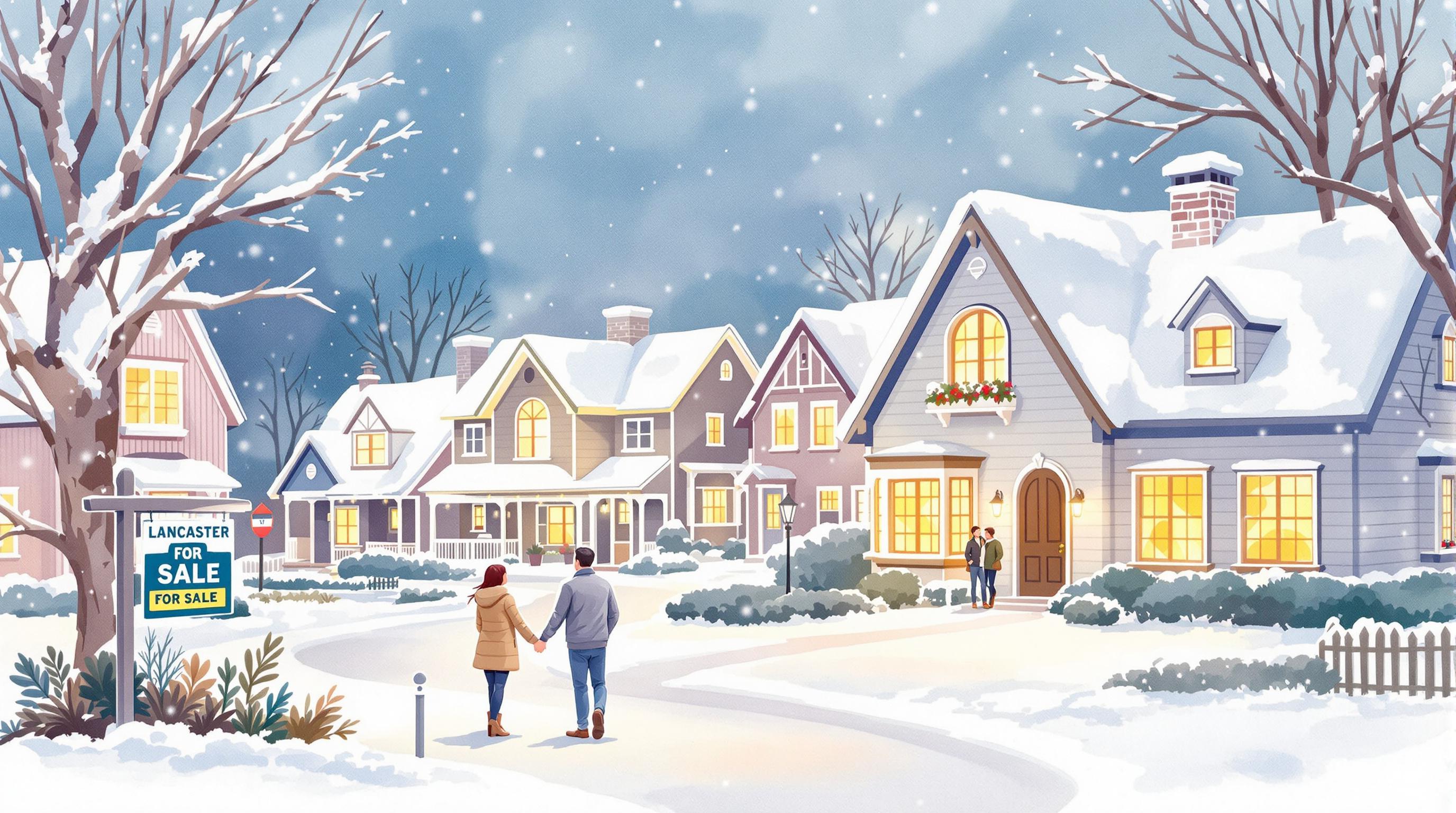Home inspections in Lancaster come with unique challenges due to the area's historic homes and weather conditions. Here's a quick breakdown of what to focus on:
- Foundation: Check for cracks, water damage, and poor drainage.
- Roof: Inspect for missing shingles, ice dam damage, and proper ventilation.
- Electric System: Look for outdated fuse boxes, aluminum wiring, and GFCI protection.
- Plumbing: Test water pressure, check for mineral buildup, and inspect pipe materials.
- Radon & Water Testing: Essential in Lancaster due to high radon levels and private wells.
- Historic Homes: Watch for lead paint, asbestos, and preservation challenges.
Average Inspection Cost: $300–$500, with additional tests costing $75–$200.
Proper inspections ensure safety, uncover potential issues, and help with repair negotiations. Keep reading for a detailed checklist to make informed decisions.
Choosing And Inspecting An Older Home In Lancaster City PA
Outside Home Inspection
Inspecting the exterior of Lancaster homes is an important step to catch potential problems early. A detailed review can help homeowners address issues before they escalate.
Foundation Check
Watch for these signs of foundation trouble:
- Cracks wider than 1/4 inch, especially vertical or diagonal ones
- Walls that bow or lean
- Gaps between walls and windows or doors
- Uneven settling of the building
Lancaster's changing weather often leads to water damage near the foundation, particularly if drainage is poor. Ensure the ground slopes away from the foundation by about 6 inches over 10 feet [1].
Roof and Water Management
With Lancaster's weather swings, keeping the roof in good shape is essential. During an inspection, focus on:
| Component | What to Look For |
|---|---|
| Shingles | Missing, curling, or damaged pieces that might let water in |
| Flashing | Secure placement around chimneys and vents to prevent leaks |
| Gutters | Proper alignment and attachment for effective water drainage |
| Downspouts | Extensions that direct water at least 6 feet away from the house to avoid flooding |
Winter ice dams are another concern for Lancaster homes. Look for signs of past damage along roof edges and check that attic ventilation is adequate to prevent future problems [2].
Exterior Walls and Openings
Lancaster's historic homes often need extra care when inspecting their exterior features. Pay attention to:
Siding:
- Look for rot, gaps, or crumbling mortar in wood siding, especially on north-facing walls
- Check brick or stone masonry for deteriorating mortar
Windows and Doors:
- Test windows to ensure they open smoothly and check for intact weatherstripping
- Inspect wooden frames for signs of decay
- Look for failed seals in double-pane windows
"Historic homes in Lancaster often feature original wood siding and decorative trim that require special care and attention" [1].
For homes built before 1978, be mindful of potential lead paint around windows and doors, as these areas tend to experience the most wear [2].
After completing the exterior inspection, you can move on to evaluating the home's interior systems.
Inside Home Inspection
Older homes in Lancaster often need detailed electrical inspections, while the area's climate and infrastructure bring unique challenges for plumbing and climate control systems.
Electric System Check
| Component | Key Checks and Common Issues |
|---|---|
| Electrical Panel | Inspect age, capacity, and look for outdated fuse boxes or low amperage |
| Wiring Type | Assess material and condition; watch for aluminum wiring (pre-1970s) |
| Outlets | Verify GFCI protection, grounding; check for ungrounded outlets or reverse polarity |
Homes built before the 1970s often contain aluminum wiring, a known safety hazard. This type of wiring typically needs to be replaced with modern copper wiring for safety and compliance [1].
Plumbing Assessment
Lancaster's hard water can affect plumbing systems over time. A proper inspection should include:
- Water Pressure: Ensure it stays between 40-80 PSI for consistent performance.
- Pipe Materials: Look for outdated materials like galvanized steel that may need replacing.
- System Health: Check pipes and fixtures for mineral buildup caused by hard water.
- Drainage: Test all fixtures to confirm smooth water flow and drainage.
"In Lancaster, PA, where hard water is common, inspectors should also check for mineral buildup in pipes and appliances, which can significantly impact system longevity and performance" [1].
Heating, Cooling, and Insulation
Lancaster's variable climate makes HVAC and insulation inspections a must.
HVAC System Inspection:
- Review the system's age and maintenance history.
- Check for even heating and cooling throughout the home.
- Inspect filters and confirm they are replaced on schedule.
Insulation Assessment:
- Measure attic insulation depth (R-38 to R-49 is recommended for Lancaster's climate).
- Use thermal imaging to check for wall insulation.
- Inspect weatherstripping on windows and doors for airtight seals.
- Ensure proper vapor barriers are in place in crawl spaces.
After completing the interior inspection, it's time to focus on elements specific to Lancaster's environment and the unique needs of historic homes.
sbb-itb-7fa5722
Lancaster Area Specifics
Lancaster's geological features and historic architecture bring unique challenges to home inspections. Buyers need to be aware of these factors during the evaluation process.
Radon Measurement
Lancaster's geology often leads to higher radon levels, frequently surpassing the EPA's recommended action level of 4 pCi/L [1]. A professional radon test typically includes:
| Test Component | Details |
|---|---|
| Duration | At least 48 hours |
| Location | Lowest living area of the home |
| Cost Range | $100–$300 |
Well and Water Testing
Key tests for properties with private wells focus on:
- Checking for bacterial contamination
- Measuring nitrate levels
- Evaluating mineral content
- Testing pH levels
- Assessing water flow rates
"In rural areas of Lancaster, PA, private wells and water systems must be inspected for safety and quality. This includes testing for bacteria, nitrates, and other contaminants" [1].
Old Home Requirements
Historic homes in Lancaster need specialized inspections due to their unique materials and structural features. Common concerns include:
| Component | Inspection Focus | Common Issues |
|---|---|---|
| Historic Materials | Asbestos, Lead Paint, Original Components | Safety concerns, preservation needs |
| Structural Elements | Foundation, Framing | Settlement issues, especially in limestone areas |
Inspectors must carefully balance safety with the preservation of historic features. For additional assessments, Central PA Realty connects buyers with local inspectors experienced in Lancaster's property characteristics and historic home evaluations [1].
Addressing these specific concerns ensures buyers are ready for the next steps after the inspection.
Post-Inspection Steps
After a home inspection in Lancaster, buyers need to take thoughtful and informed steps to safeguard their investment and address any issues highlighted in the report.
Reviewing the Inspection Report
Go through the inspection report thoroughly and categorize the findings into three levels of urgency:
| Priority Level | Types of Issues | Recommended Action |
|---|---|---|
| Critical | Safety hazards, major system failures | Immediate action needed |
| Moderate | Aging components, code violations | Address within 3-6 months |
| Minor | Cosmetic concerns, routine maintenance | Schedule for future attention |
Pay close attention to major systems and structural elements flagged by the inspector, as these often need the most urgent attention.
Negotiating Repairs
To handle repair negotiations effectively, it's crucial to prioritize the issues and understand associated costs. Work with your agent to submit detailed repair requests that include:
- A clear description of the problems identified
- Professional repair cost estimates
- Photos from the inspection report
- Suggested solutions or credit requests
This approach ensures that your concerns are communicated clearly and backed by evidence.
Additional Inspections
Certain findings may call for specialized inspections, especially given Lancaster's property-specific challenges. Common additional inspections include:
| Inspection Type | When to Consider It |
|---|---|
| Structural Engineer | Issues with the foundation or settlement |
| Mold Assessment | Signs of moisture or visible mold growth |
| Pest Inspection | Evidence of wood damage or insect activity |
For these specialized assessments, Central PA Realty can connect you with experienced local professionals familiar with Lancaster properties. These experts can provide in-depth evaluations to help you make informed decisions and plan for future maintenance needs.
Summary and Help
A Lancaster home inspection sheds light on key areas buyers need to address to protect their investment and negotiate confidently. For instance, major repairs like roof replacements can cost between $5,000 and $15,000, while foundation repairs may range from $500 to over $10,000, depending on the severity [2].
Here are some priority areas specific to Lancaster properties:
| Area of Concern | Impact on Buyer Decisions | Negotiation Considerations |
|---|---|---|
| Radon Testing | Often required and can affect the sale timeline | May lead to repair requests |
| Well/Water Systems | Essential for rural properties | Can influence property value |
| Historic Home Elements | May need specialized repairs | Often requires expert evaluation |
| Foundation Assessment | Crucial for purchase decisions | A major point for negotiation |
For buyers interested in historic properties, Central PA Realty connects them with local experts familiar with Lancaster's unique housing needs.
Central PA Realty also offers tailored support during the inspection process, including:
- Access to certified local inspectors
- Advice on property concerns specific to the area
- Expert help with repair-related negotiations
- Connections to trusted repair professionals
Pennsylvania homes often come with their own set of challenges [3]. By addressing these inspection findings early, buyers can make smarter decisions and ensure their investment is safe and sound.



